#Thought Meanders
Text
Musings | Thought Meanders~3 |
Thought Meanders~3
I’ve got a writer’s mind. It wanders random paths across time and space, pausing at horizons unseen, bridging darkness and light and weaving tapestries in a million hues of life.
Welcome to my Musings | Thought Meanders~3 |
I am thrilled that you decided to stop by! Lose yourself in the meanders of my thoughts for a few moments, let go of the tangible and transcend into a…
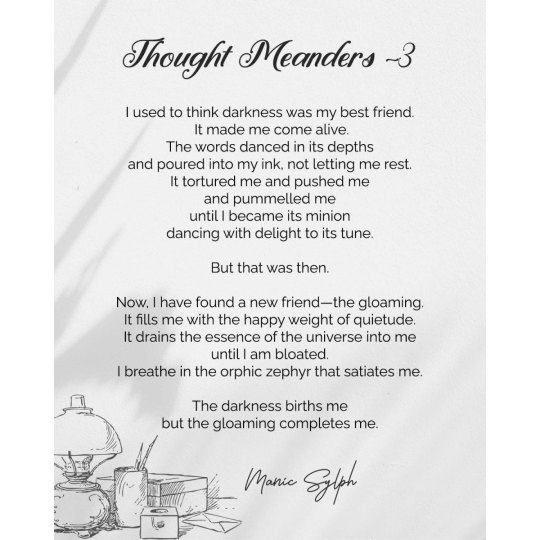
View On WordPress
0 notes
Text
One thing I love about Crowley --never stated, but consistently shown-- is that he is, at heart, an engineer.
I have a few different things to say about that. Let's unpack them.
As the Unnamed Angel, we see his designs for the Pillars of Creation are millions of pages long, comprised of cramped text, footnotes, diagrams, schematics, etc. It's very...Renaissance polymath, in the way it implies a particular intersection of artist and inventor.
Also: in the naked romanticism with which he views his stars.
We already knew he made stars, but in s2 we learn that he did NOT sculpt each of them by hand. He designed a nebula ("a star factory," he says) that will form several thousand young stars and proto-planets, and all --aside from getting the 'factory' running-- without him lifting a finger. We also learn that these young stars and proto-planets stand in contrast to those made by other angels, which are going to come 'pre-aged.'
...I'm reminded of Hastur and Ligur's approach to temptations. Damning one human soul at a time, devoting singular attention to it over the course of years or decades, and how that stands in contrast to Crowley's reliance on, quote, 'knock-on effects.'
Ligur: It's not exactly...craftsmanship.
Crowley: Head office don't seem to mind. They love me down there.
Hm.
I'm also reminded of the M25.
The M25 may not be as grand as a nebula (sentences you only say in GOmens fandom...), but LIKE his nebula it's an intricate, self-sustaining engine that does Crowley's work for him, many times over. Again.
That's some pretty neat characterization --and so is the indication towards Crowley's disinterest in victimizing anyone tempting individual people. It takes a considerable amount of planning and effort (and creeping about in wellies), but in accordance with his design the M25 generates a constant stream of low-grade evil on a gigantic scale.
Cumulatively gigantic, that is. Individually? Negligible.
But no other demon understands human nature well enough to parse that one million ticked-off motorists are not, in any meaningful way, actually equivalent to one dictator, or one mass-murderer, or even one little influential regressive. That's the trick of it. Crowley gets Hell's approval (which he NEEDS to survive, and to maintain the degree of freedom he's eked out for himself), and at the same time ensures that any actual ~Evil Influence~ is spread nice and thin.
It's some clever machinery. And he knows it, too:
The Unnamed Angel and Crowley are both proud of their ideas.
(musings on professional pride, Leonardo da Vinci, the crank handle, and 'the point to which Crowley loves Aziraphale' under the cut)
In the 1970's Crowley gives a presentation on the M25, projector and all, to a room full of increasingly impatient demons. Maybe the presentation was work-ordered; the 'can I hear a WAHOO?' definitely wasn't.
Before the Beginning, the Unnamed Angel can barely contain his excitement about his nebula. Aziraphale manages a baffled-but-polite, "....That's nice... :)"
11 years ago, Hastur and Ligur want to 'tell the deeds of the day,' and Crowley smiles to himself because (according to the script-book) he knows he has 'the best one.'
(Naturally, his 'deed' has nothing to do with tempting anybody, and everything to do with setting up a human-powered Rube-Goldberg machine of petty annoyance. Oodles of 'Evil' generated; very little harm done.)
Hastur and Ligur don't get it, of course. That's also consistent.
Nobody ever knows what the hell he's talking about.
It didn't make it on-screen, but, in both the novel AND the script-book, Crowley was friends with Leonardo da Vinci. The quintessential Renaissance polymath. That's where he got his drawing of the Mona Lisa --they're getting very drunk together, and Crowley picks up the 'most beautiful' of the preliminary sketches. He wants to buy it. Leonardo agrees almost off-the-cuff, very casual, because they're friends, and because he has bigger fish to fry than haggling over a doodle:
He goes, "Now, explain this helicopter thingie again, will you?" Because he's an engineer, too.
(It is 1519 at the latest, in this scene. Why the FUCK would Crowley know about helicopters, and be able to explain them, comprehensively, to Leonardo da Vinci?
...Well. I choose to believe he got bored one day and worked it out. Look, if you know how to build a nebula, you can probably handle aerodynamics. And anyway, I think it's telling that this is his idea of shooting the shit. 'A drunken mind speaks a sober heart,' and all. He probably babbled about Aziraphale long enough to make poor Leo sick)
Apart from Aziraphale, Leonardo da Vinci is the only person Crowley has any keepsakes or mementos of.
Think about that, though. Aziraphale's bookshop is bursting with letters, paintings, busts, and personalized signatures memorializing all the humans he's known and befriended over 6000 years (indeed: Aziraphale has living human friends up and down Whickber Street. He's part of a community).
Crowley doesn't have any of that. It's just the stone albatross from the Church (for pining), the infamous gay sex statue (for spicy pining), the houseplants (for roleplaying his deepest trauma over and over, as one does), and this one piece of artwork, inscribed, "To my friend Anthony from your friend Leo da V."
To me, at least, that suggests a level of attachment that seems to be rare for Crowley.
...Maybe he liked having someone to talk shop with? Someone who was interested? Someone engaged enough to ask questions when they didn't immediately understand?
...Anyway.
There's also the matter of the crank handle.
This thing:
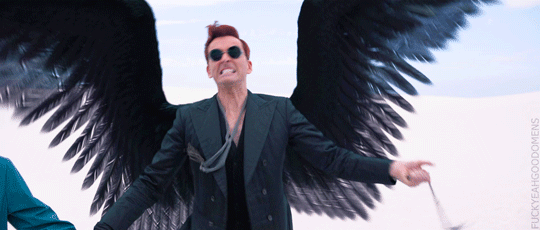
This is one of the subtler changes from the book. In the book, Crowley knows Satan is coming and, desperate, arms himself with a tire iron. It's the best he can do. He's not Aziraphale; he wasn't made to wield a flaming sword.
The show, IMO, improves on this considerably. Now he, like Aziraphale, gets to face annihilation with what he was made for in his hand. And it's not a weapon, not even an improvised one like the tire iron.
He made stars with it.
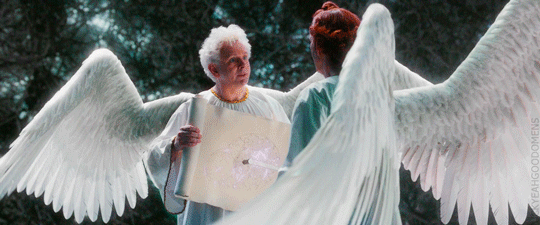
[both gifs by @fuckyeahgoodomens]
If you Google 'crank handle,' you'll get variations on this:
Crank handles have been around for centuries. Consisting of a mechanical arm that's connected to a perpendicular rotating shaft, they are designed to convert circular motion into rotary or reciprocating motion.
Which is to say they're one of the 'simple machines,' like a lever or a pulley; the bread and butter of engineering. You'll also get a list of uses for a crank handle, archaic and modern. Among them: cranking up the engine of an old-fashioned car... say, a 1933 Bentley. That's what Crowley has been using his for, lately. But he's had it since he was an angel and he's still, it seems, very capable of it's angelic applications.
Stopping time. For instance.
(This is conjecture on my part, but, I like to imagine that Crowley has the ability to stop time for the same reason I can --and should-- unplug my computer before I perform maintenance on it. Time and Space are a matched set, after all, and in his designs in particular, one feeds into the other.)
I know everyone has already said this, but: I REALLY LIKE that when he needs to channel the heights of his power, he does so not with a weapon but with a tool. Practically with a little handheld metaphor for ingenuity. One from long-lost days when he made beautiful things.
(And he loved it. Still loves it --he incorporated that metaphor into the Bentley, didn't he?)
Let Aziraphale rock up to the apocalypse with a weapon: he has his own compelling thematic reasons to do exactly that. Crowley's story is different, and fighting isn't the only way to express defiance. And if you've been condemned as a demon and assumed to be destructive by your very nature, what better way than this?
He made stars. They didn't manage to take that from him.
Neither Crowley nor Aziraphale are fighters, really --they have no intention of fighting in any war. They'll annoy everyone until there's no war to fight in, for a start. But between the two, if one must be, then that one is Aziraphale. Principality of the Earth, Guardian of the Eastern Gate, Wielder of the Flaming Sword... all that stuff. Even if he'd prefer not to, it's very clear that Aziraphale can rise to the occasion, if he must.
Crowley was never that kind of angel. He wasn't a Principality. He doesn't have a sword.
...And yet.
It's Crowley who protects. He's the one who paces, who stands guard, who circles Aziraphale and glares out at the world, just daring anyone else to come near.
In light of everything else I've said here, I think that's interesting.
Obviously part of it is that Aziraphale enjoys it and, you know, good for him. He's living his best life, no doubt no doubt no doubt. But what about Crowley? What's driving that behavior, really?
Have you heard the phrase, 'loved to the point of invention'? Well, what if 'the point of invention' was where you started? What if where you end up involves glaring out at the world, just daring anyone else to come near? What is that, in relation to the bright-eyed thing you used to be?
What do we name the point to which Crowley loves Aziraphale?
...Thinking about how an excitable angel with three million pages of star design he wants to tell you all about...becomes a guard dog. Is all.
#good omens#ineffable husbands#aziracrow#Crowley#Aziraphale#good omens 2#good omens meta#unfortunately I do not have trains of thought#only long meandering strolls of thought#sorry about it#anyway tl;dr Crowley is a nerd#also I have a strange emotional attachment to the idea of 1500's Crowley...#...facedown in a pile of Mona Lisa sketches; drunkenly info-dumping about Aziraphale#and Da Vinci is just like. 'Ahhhh mio amico Antonio. You fucking simp.'
10K notes
·
View notes
Text
seeing a post that basically confirmed the obvious disparity in content made me think more about a scene i would have liked to see with gale and that i've been thinking about for a while now.
i always felt a bit sad that his condition is so often treated as a joke by the fandom and to a lesser extent by the game itself. i always thought that this is partially down to the fact that we don't truly get so see gale actively be in pain due to his condition, other than brief glimpses and hints:
we do hear the urgency in his voice when he explains when and why he needs an artefact and the relief in his voice when the protag chooses to help him.
we see it, too, when he is afflicted by the arcane hunger condition:
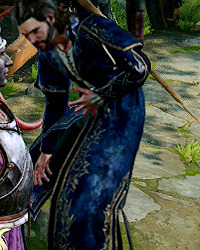
we get glimpses of it when he consumes an artefact:
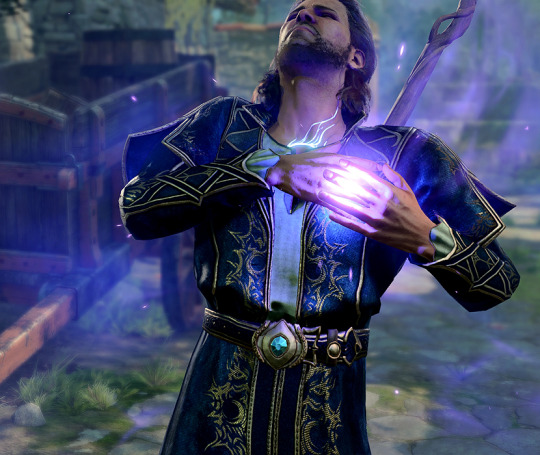
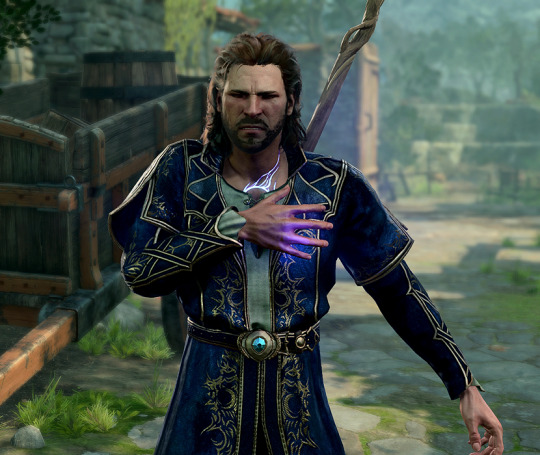
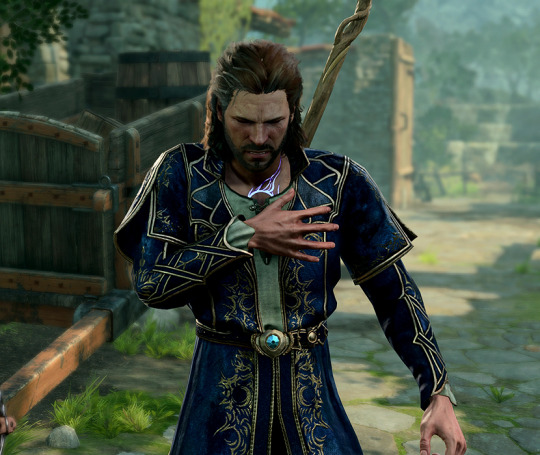
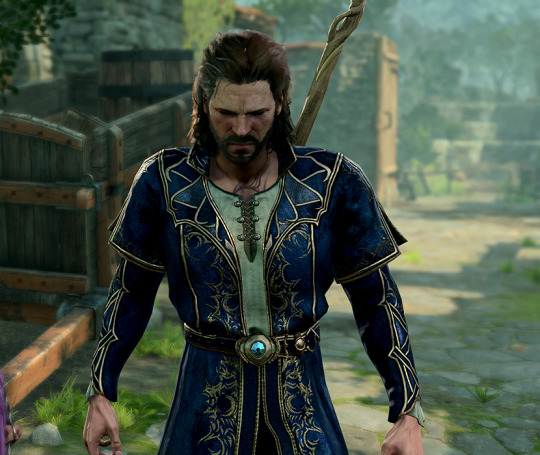
he mentions it, too, in his dialogues, but it's very much downplayed by gale or phrased in such a way that is meant to overplay it with humour, or perhaps even to distance himself from it by using metaphors:
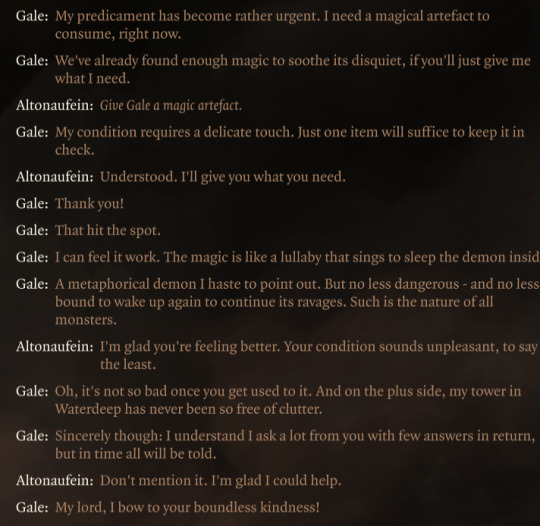
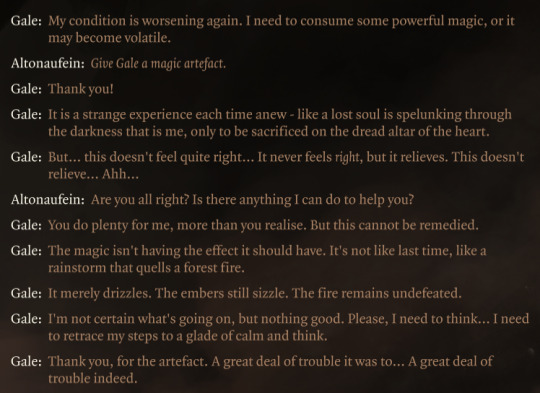

that is until we actually get to see it through his eyes, if only for the briefest of moments:

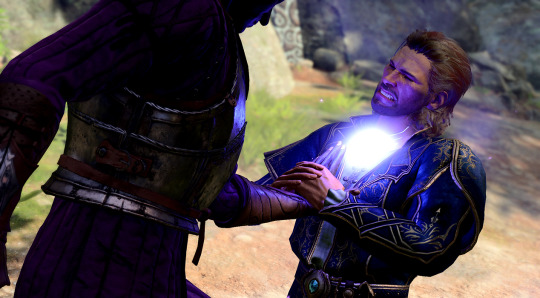
*Its teeth, its claws, it's unstoppable as it digs through and becomes part of you. And gods, it is ever-hungry...*
gale also has an idle animation where he--quite often--reaches up to touch the orb, perhaps because it flares with pain, like an old wound is wont to do:
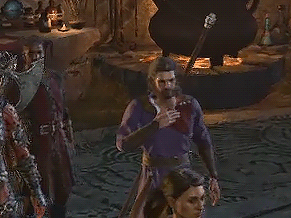
(gif by @bladeofavernus)
from the last conversation we have with gale, and after catching all of these little moments of things he says or does with how the orb affects him, we learn that consuming the magic from artefacts no longer has any effect at all. the only solution that tara and he were able to find no longer works:
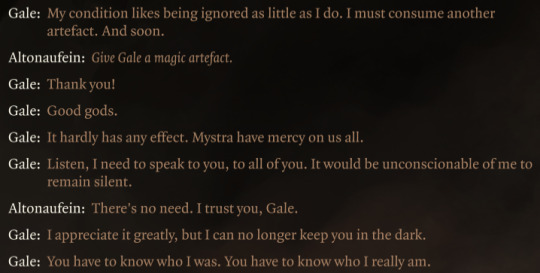
it would scare him and imbalance him, and it would finally destabilise the orb, make it more volatile.
but what happens in the game after that? the orb becoming volatile enough for the artefacts to no longer have an effect has no consequences at all: you are able to do the tiefling party, all quests in the underdark, the entirety of the grymforge, and, should you choose to do so, the entirety of the mountain pass and rosymorn monastery without an incident at all or any mention of the condition itself/any discomfort or fear it might cause.
there's no urgency here, no follow-up, to what the narrative set up... and then we meet deus ex elminster and the orb is stabilised, and the urgency that came before literally is handwaved out of existence.
what i would have liked instead to happen--or at least to bridge the gap between the artefacts no longer working and elminster stabilising it to be used on mystra's behalf--is the following:
i think it would have been nice to have a scene with gale where we do get to see--on a much smaller scale--him losing control over the orb, have the protag and the companions see what he is trying desperately to keep contained within himself, what gnaws at him, what continues to haunt him.
it could happen perhaps after a particular gruelling and intense fight--and there are enough of that in the underdark and at the mountain pass. it could have been a ! conversation, providing both friendship and romance content.
have the orb act up after expending so much energy to manipulate the weave to the fullest of his abilities, have gale manage to reign it in, but barely, show that it takes a lot of power and effort for him to do so.
that it hurts, with none of gale's metaphors to hide behind or jokes to play it off.
have the audience truly see the gravity of what he is going through.
#gale dekarios#gale of waterdeep#bg3 spoilers#i think it also would have made the scene with elminster and mystra's demands even more impactful than it already was#also i am a sucker for parallels but gale falling to his knees again and tav pulling him up again as on on-going motive makes me Feral#anyhow excuse the long meandering here#many thoughts#but my brain is literally soup rn#ch: gale dekarios#vg: baldur's gate 3#series: baldur's gate#meta: mybg3#long post for ts
2K notes
·
View notes
Text
The way Annabeth was thinking so far ahead of Percy that Percy was confused. The way she refused to elaborate on anything, and then was like; 'I'm surrounded by idiots' whenever someone (Percy) didn't understand her. The way she looked so smug after she pushed Percy into the water and he got claimed. THE WAY SHE WAS SO BLUNT!!!!! ("ARE YOU STALKING ME??" "yeah lol")
Sorry, but that's the most accurate Annabeth in the world holy smokes Leah did such a good job. All my forgotten love for Annabeth's character that I felt while reading the books just crashed into me full force and I'm frothing at the mouth with obsession.
“-You’re gonna expect me to know how to do something I don’t know how to do, and I end up falling flat on my face, I- I can’t really have that right now.” “You still don’t get where you fit into all of this, do you?” SHE’S TALKING ABOUT THE PROPHECY AND HOW SHE KNOWS HE'S A POSIEDON KID, BUT SHE HIDES IT AS HOW HE DOESN’T KNOW HIS PLACE IN THE CAPTURE THE FLAG GAME!!!! BECAUSE SHE WON’T TELL HIM!!!! AND ITS EPIC BECAUSE IN THE CAPTURE THE FLAG GAME HE DOES FALL FLAT ON HIS FACE, BUT IN THE PROPHECY HE DOES GET HIS DAD TO SEE HIM!!!! And then she fixes his armor plate, making sure that its secure. Making sure he won't get hurt. That's not part of her plan, and things always go according to her plan. She's the game master. IM SCREAMING
#just posting some of my thoughts because I haven't seen anyone else going feral over annabeths portrayal yet#she was by far my favourite part holy shit idk what crack leah laced in her characterization but I am so addicted#HER SMUGNESS#HER APOLOGETIC LOOK BEFORE PUSHING PERCY INTO THE WATER#NO SOCIAL SKILLS - ALL BLUNT ANSWERS AND LAME ASS JOKES#shes just skipping under the invisibility cap#meandering after Percy as Clarrise beats him up#whistling out of tune while vaugely wondering how she'll get Percy to let her join his quest after this#im sorry but i am so crazy about her portrayal holy smoking Hephaestus someone help me#pjo+#percy jackon and the olympians#silly mispelled trending tag#percy jackson#annabeth chase
412 notes
·
View notes
Text
I think there comes a point at which a fandom is large enough that you get fans in it who aren't actually even slightly interested in the canon, let alone fans of it. And one of the bizarre symptoms of this size of fandom is that they become loyal fans of characters who aren't really characters in canon.
For example, there are so many characters in Naruto who have almost no page time, very little evident personality, and weirdly intense fans. Usually, in fandoms of all sizes, fans love characters and ships that feature relatively defined characteristics. We've all met the But Sasuke Did Nothing Wrong people, listened to the the Kisame girls, or nodded along to that one friend who has fallen down a Minato/Kushina rabbit hole and can't get up. These are all characters with characteristics (although we could argue for days about their quality—that's a post for another time). You would get that kind of fan activity anywhere there was fandom.
But then, when the fandom is big enough that there's a mass of content that actually concerns extremely minor characters with few characteristics, you get something else. In Naruto fandom... you get the person who is dedicated to any given Izuna ship. You know, Madara's brother who looks like Sasuke and whose primary role in the manga is being dead? You get the person who insists Shisui is "a joyful flirt." There's more than one person who appears out of nowhere to ask: I am sick with my longing for romance fics about Rasa, can you write more about Rasa?
Ra... Who? Gaara's dad? Yes, Gaara's dad!
We have all encountered these people. And I say "people," because I've encountered more than one of each of the above examples.
I think this is the same phenomenon as people who get really into, like, Regulus Black. You have to like, wrap your head around the idea that they're not actually fans of the canon material. They're fans of the fandom.
The fandom is so large, and so many layers deep, that it gives characters who are really just answering a little question in the canon storyline ("Where did Gaara get that demon?" "Who put the locket in the Black townhouse?" "Why is Madara like this?") much more significance and, well, character. So now ...they get fans too!
#I was trying to figure out which word in the question about Madara to <em> and then I realised it was all of them#tozette.txt#fandom#fandom culture#naruto#harry potter#this is poorly written#why is the conclusion to a thought in one paragraph meandering off into the next#but i guess that's what a blog is for#poorly written commentary
150 notes
·
View notes
Text
in an apocalypse scenario you'd think bob dylan would be the first to go but given the fact that his irl survival rate is somehow 100% in spite of experiencing every flavour of near-death experience and drug addiction in existence, I actually think he'd somehow survive it and end up as the absent first-in-command of a commune in woodstock. He would hate it with fervor but unfortunately that's just a consequence of being bob dylan
#emi's meandering jotts#hi guys. can you tell I've put too much thought into this over the last 3 years
117 notes
·
View notes
Text
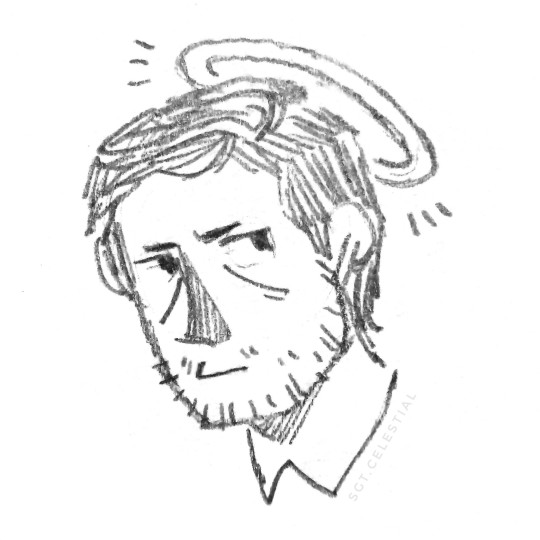
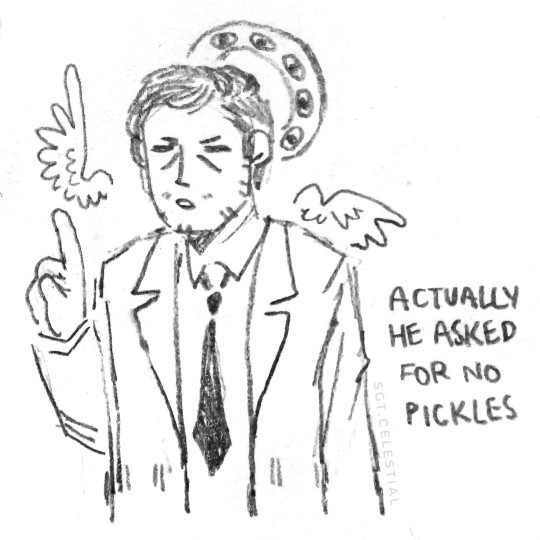
what is a super natural
#tv presenter voice helloooo gay people.#i didnt know what to draw so i thought i would dip into ancient territories and fill the gaps in my page with cas 👍🏻#very funny looking page atm bc its like. ocs. beatles. monkees. ocs. bill and ted. bob dylan. monkees. CASTIEL SUPERNATURAL. beatles❤️#hes just vibing in there now i guess -_-🏳️🌈#spn#emi's meandering doodles
592 notes
·
View notes
Text
thinking about that small moment between deanna and ashton (ashford) amidst all the chaos, the glimpse of recognition opposite the aeormaton they stumbled upon and cared for (in their own ways). how aabria mentioned she crafted different aspects of deanna to connect to each of bell’s hells: for ashton, coming back from death and finding a world slightly askew, rediscovering their place in it, and what remains of the frayed threads connecting them to it. to grappling with their relationship to power and “pay attention to who you want to be”
#tangential to her conversation with chetney and his line ‘out here in my own story it’s cool’ in terms of finding agency and challenging#preconceptions of purpose and identity in the wake of new powers. but never without empathy (per the context of the og conversation)#critical role#cr spoilers#just a small meandering thought. I’m sad the cross split guest relationships didn’t get more time but obviously a ten-pc table is#a BIT unwieldy.#deanna leimert#ashton greymoore
241 notes
·
View notes
Text
the thing about Dimension20 is that I even love it when they do things that i don’t particularly like
this includes art styles, story beats, or even potentially the premise/execution of an entire season
because if they only did things i liked, that would almost certainly mean they were playing it safe, watering things down to be as palatable to as many people as possible
but when there’s something there that just isn’t for me?
they took a swing. they experimented. they did something new
and even if you set aside what might be a miss for me might be a grandslam for someone else, I’d so much rather they took swings and missed instead of bunting the whole game
and you might be wondering why i’m posting this right before FHJY comes out
right after reblogging an intro that “owns my whole heart”
you can’t really judge a season before it comes out
so this might age poorly
i’m not worried about Junior Year. I won’t be surprised if i love it a little more than is healthy
But I need to acknowledge that everything I’ve seen thus far is the kind of awesome that you only get from a whole group of people challenging themselves, taking risks, and honing their craft
So i just want to say that I love Dimension 20, not in spite of the things that missed for me or the weird bits, but because of them. Because they are part of a whole. And from what i can see, all the risks and stumbles so far are paying off beautifully
#dimension 20#d20#dropout#fantasy high#fantasy high junior year#meandering thoughts#meandering thots#it might just be the coffee talking but i love everyone in this bar#the creative team is so good
99 notes
·
View notes
Text
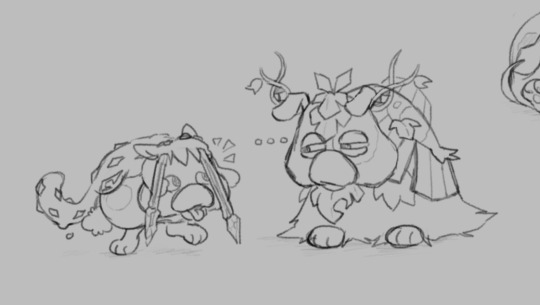
500TH POST IS MOSS GIVING THE PLAYER A MEAN LOOK MONDAY YEAHHHH 🎊🎊
anyways to celebrate here is moss and oatchi as. treasures of ruin. because like i said the snail one had the homophobic dog stare and thus. was the perfect moss pokemon
it makes sense ok
#love them sooooo much <333333#i know oatchi really isnt chien pao but none of the other ones really fit him either so#i thought the tiger skin look was fun enough to pick chien pao for#oatchi killed and skinned that thang by himself btw. if you were wondering#what an awesome little guy <33#pikmin#pikmin 4#moss pikmin#oatchi#various meanderings#do i tag this pokemon#yknow im sure those guys would like it#pokemon
56 notes
·
View notes
Text
the thing that gets me so much about the storytelling in knives out is that it's a story within a story within a story- or i guess more accurately, it's a story about multiple stories being told and acted in and against each other. ransom/hugh/supreme scumbag wrote the story of harlan's murder and of pinning the crime on marta; meanwhile, harlan wrote the story of what marla would do in the aftermath of his death and the ensuing investigation.
problem for mr. hugh is, marta is not a flat character or a pawn in his game he can manipulate to his will to ensure he gets away scot free (and, to a lesser extent, despite harlan's insistence and marta's best efforts, marta cannot carry out his lie for long during the high-pressure investigation. even when it's in her own best interest to lie, marta cannot and will not be manipulated into telling a false story). marta is a smart and caring human being who has agency in her narrative- and since she is the heroine, the narrative wants her to win, so she has allies like blanc on her side. blanc mostly doesn't interfere with the stories being told, he observes them and then, as he says, strolls leisurely along the real story- the truth's- axis and eventually comes to its inevitable conclusion. this is when he will step in and act upon the narrative, but only to reveal the truth and to ensure the hero gets the rewards they deserve.
on top of all that, it really gets me how there's a very meta framing device of the primary murder victim in this mystery being a famous murder mystery author, and much of the plot revolving around his efforts to author what his loved ones' lives will be like after his death... and the way hugh's murder plot is like something right out of a harlan mystery novel (to the point that harlan, before he realizes he's about to die, makes a point to write down the method of murder as an ingenious way to kill someone)....... and all that isn't even considering all the stories the family members tell themselves and others about their relationship to harlan, how they view the family legacy, etc.
marta is the heroine precisely because she is not trying to tell a false story for her own gain (as the family accuses her of doing after the reading of the will)- she is simply concerned with carrying out her late friend's wishes and doing right by him. she is probably the only person who really knew harlan, the full truth of him, and was his friend without any selfish agenda. she is a good person, a person who would never try to claim another's story as her own, which is exactly why harlan trusted her with his life, his home, and his legacy. he couldn't have known what would happen, but he knew she would do her best to honor his memory after he was gone. ultimately though, no matter who else tried to write or edit it (including harlan), this is marta's story and hers alone to live and change and discover.
this has been a long post already so i'll end it here but suffice it to say that over four years post-release, i'm still so fascinated by the ways these characters actively try to either rewrite the story playing out in front of them, or reveal the truth at the heart of things (as blanc would say, the hole inside of the donut's hole). this movie just makes my storytelling and puzzle-loving nerd heart go BRRRRR
#knives out#knives out 2019#mine#knives out meta#knives out analysis#idk what else to tag 🤷🏻♂️ but if you actually read all this pls reblog and tell me ur thoughts!!!#it means a lot !!#esp since tumblr tried to SILENCE ME by refreshing after i had done a lot of editing and drafting and making me lose my progress >:(#so if this seems meandering and nonsensical it's bc i had to try and rewrite a lot of it from memory lol 🙃#anywayyyy knives out tumblrinas rise up!!!
49 notes
·
View notes
Text
Musings | Thought Meanders~2 |
Thought Meanders~2
I’ve got a writer’s mind. It wanders random paths across time and space, pausing at horizons unseen, bridging darkness and light and weaving tapestries in a million hues of life.
Welcome to my Musings | Thought Meanders~2 |
I am thrilled that you decided to stop by! Lose yourself in the meanders of my thoughts for a few moments, let go of the tangible and transcend into a…

View On WordPress
1 note
·
View note
Text
I’ve been thinking a lot about critique, especially in the context of the art school, and where it succeeds and where it fails the artist.
So much of the critique we are taught to give, expect, and receive happens when something is finished. You present a fully rendered piece of work in front of the classroom for judgment. You’ve been taught never to just say, I like it, It conveys its message, It’s lovely, because that’s not “actionable” feedback. And instead the piece is combed over for flaws, because pointing out a flaw is “actionable”.
But it’s not actually always very helpful, is it? It demoralizes the uncertain learner. And the piece is finished, so any critiques may never be applied. There is no guarantee in the modern conception of the art school that you ever work on another assignment that you can apply the critique. Did you learn anything, other than to be terrified of flaws? What was subjective and objective? Did you learn to hone your own critical eye to your own art, or simply to fear that you’re missing something?
I think, so often, of the students crying in the halls after, during critique. And of all the people who hate critiques. Critique is such a beautiful part of the art making process, but most of us do not understand how to apply it, when to apply it, why to apply it, or what it really is.
Critique of the final work is useful. I think in some ways, that critique is most valuable to the viewer, to understand what they’re looking at, why and how the art works or does not, to ask questions. All critique has its place. But critique during the process of making, that’s the most powerful critique as an artist. It’s also the critique the fewest people have access to. You have to be in the classroom or the confidence of an artist to be allowed into the incredibly intimate and vulnerable critique space. It’s this extreme show of trust. It’s this precious thing, opportunity, skill, that I think the art school squanders by prioritizing the end of project group critique.
Really, there is nothing more valuable than learning how to talk about your work unfinished, and, as an artist, learning how to ask questions about your work in progress. Not simply putting your work out there for judgment, but to ask questions about all the things you’re puzzling over. Learning to present the uncertainty, wondering where your piece is going to go next. You might forge this relationship with some trusted friends. People with taste, eyes, instinct you trust.
Maybe this post is just a love letter to the in progress critique. Maybe I want people to be free to just say, I like it, It conveys its message, It’s lovely, because sometimes you need to hear that before you really dig in. Maybe I want people to learn to critique positively, focusing on what is working now and trying to figure out together how to highlight that and improve on it to show off your strengths. I don’t know. I’m stewing in my thoughts. I’m sad for the students crying in the halls. But I’m in love with every person who I trust to critique my work, that gently mould the goopy raw bits of my heart I give them to pick at.
#i don't think this is coherent but i'm posting it anyways#if i ever write this properly it'll go on cohost not here lmao#text#meandering thoughts
75 notes
·
View notes
Text
After taking the time to really sit and process the roller coaster of information that was the recent People Make Games video about the drama surrounding Studio ZA/UM, I wanted to make this post to go over some of my thoughts that I had about the video. If you have not watched the video but are curious what people are saying about it or you have and you want to read someone else’s perspective, then I invite you to read through as I babble incoherently.
Overall, I thought it provided an interesting, in-depth look at the timeline of events leading up to Kurvitz, Rostov, and Hindpere’s dismissals while also giving us a proper inside scoop to the interpersonal relationships of both the former and current Studio ZA/UM employees. However, I do think the video has a couple of problems specifically with the way some of the information is presented on top of the fact that it loses focus partway through from the real issue which is the alleged fraud that took place by the investors to acquire the majority share within the company.
A big problem that I had with the video was the way in which Kurvitz behavior and final statement are disproportionately framed in the narrative. Now I am not about to go on a lengthy rant to dismiss everything Robert Kurvitz did to his friends during his time at the studio. In fact, the thing that I really liked about this video was how Chris Bratt, the writer and interviewer, holds no punches when it comes to the accusations of misconduct we heard from current Studio ZA/UM employees against him. Instead, I think it needs to be addressed that Bratt left out background context, whether intentionally or unintentionally I do not want to speculate, that could potentially explain what happened to everyone leading up to the expulsions to make Kurvitz appear far worse than how he might’ve been. I fully believe every word Argo Tuulik, Kaspar Tamsula, and Petteri Sulonen has said about working under Kurvitz and his inner circle so by piecing together all their statements to create a timeline of events the investors start to look far less innocent than how they portray themselves to be in the video.
It’s abundantly clear that Kurvitz was notoriously hard to work with. However, what’s also clear was the tremendous amount of stress everyone was under while also still being in the throes of burnout after working on the game nonstop for months. I think the investors (Kender, Haavel, and Kompus) purposefully set the team up for failure by creating impossible deadlines without informing the writers, approving Kurvitz and his inner circle to take time off while disallowing the others from taking theirs, and attempting to restructure the company in preparation to franchise Disco Elysium against Kurvitz wishes and thus he felt scared enough to push for his role to be de facto creative leader anywhere he could. What seems to be three full years of forcing everyone to crunch, miscommunicating when important deadlines were, setting impossible work standards to meet, and readying themselves to snatch more power within the company may have helped sow the seeds of animosity the writers began growing towards one another.
All of this is nothing new for those of us who have been keeping an eye on the drama from the start. We were told long in advance by the likes of Martin Luiga, who although left the project early on has been friends and worked alongside him for the better part of two decades, that Kurvitz possesses less than stellar leadership skills and that there was no merit in what the investors would end up accusing him of doing to warrant his dismissal. That confirmation was given long before the release of the PMG video and cements the idea in my mind that perhaps Kurvitz erratic behavior that was described by the current Studio ZA/UM employees was not the cause but rather a symptom of a much larger problem happening around him (i.e. a toxic work environment brought on by the investors using manipulation tactics to further stress and cause resentment amongst the collective). Yes, Kurvitz was at times uncooperative and dismissive towards his fellow employees, but this aspect of his character and the situation was played up to be a far greater problem in the PMG video than what the context suggests. I’m also inclined to believe this interpretation because Argo Tuulik, despite having legitimate, unresolved issues with his friend, does still regard Kurvitz very highly and even believes that he should still have artistic access to Elysium.
When you think about it from this perspective, it makes perfect sense as to why Kurvitz was acting erratically around his fellow coworkers who eventually lashed out at him. On top of Kurvitz’s subpar leadership skills, he clearly was rapidly losing control of the situation which caused a great amount of stress for everybody involved as he scrambled in every which way to hold onto his position within the studio. It does not surprise me when it’s admitted by Sulonen that Kurvitz was thinking of taking the source code to potentially start over with a newly founded company since the situation was rapidly deteriorating and everyone was getting more and more frustrated with him and his inner circle. The impossible working conditions they found themselves in was a pressure cooker for the animosity and resentment building within the disillusioned group. Clearly the investors made their workers run themselves ragged in order to divide everyone and make it easier for them to take advantage of Kurvitz’s now frequent outbursts to finally push him out of their way.
Everything that I’ve said above can easily be discerned from the context clues found in the interviews from the current and former ZA/UM members. Which if you think about it is an unfortunate statement because Bratt does not seem to register the complaints of mismanagement by the hands of the investors from either side and instead only points the spotlight at Kurvitz’s past transgressions. What I am describing is one of the major issues I have with the PMG video. The video talking about the ongoing legal battle to determine if corporate fraud took place seemed to disproportionately focus on the problems Kurvitz and his inner circle had with other team members and not issuing a public apology to his former colleagues. Now that doesn’t sound all too bad on paper, right? If Kurvitz apologized, it could help begin the healing process and make for a good closer for the video. Well, that’s where the problem comes into play because Kurvitz response to Bratt’s request for comment regarding what Tuulik, Tamsalu, and Sulonen said about his poor conduct should not come as a surprise to anyone who had been paying attention. In the video, Bratt hails the email Kurvitz sent back to him as arrogant and dismissive which he then uses to accuse him of not standing with his fellow workers in solidarity and not taking accountability for his actions. However, right at the start of his interview, Kurvitz informs Bratt that at the behest of his lawyers he does not want the full interview to be published as they are worried Studio ZA/UM might take something he said as an admission of guilt and use it against him in a court of law. Therefore, when asked to comment about what his former colleagues said about him, he fires back an email that basically says that he wants the focus to be on the thing that really matters, the lawsuits and the shady activities of the investors. Bratt, clearly not liking his response, decided to attack his statement even though had Kurvitz given PMG what they wanted he could potentially be incriminating himself. Whether he denies or fully understands that his actions hurt others, the way he responded is 100% justified and did not deserve the level of vitriol he got from both Bratt and the public. It seems like a double standard that Ilmar Kompus can deny answering a question by claiming he cannot comment due to the ongoing lawsuit during his interview but when Kurvitz does it for the exact same reasons he is attacked. Again, Kurvitz is fully responsible to rectify the hurt he caused others but legally he’s in the clear and Bratt seemed to purposely neglect that aspect of the ongoing narrative.
Now, I’m not about to pull a whole reddit conspiracy in my write up. I do believe Chris Bratt, who directed this video, went into this with the very best of intentions to tell the full story with an emphasis on the workers who were affected by the situation. However, the problems that I’ve listed above make me worry what will be the takeaway from someone who is only a casual observer of the ZA/UM situation. Personally, I have been following this from the beginning so I’ve had a lot of time to develop my own insight into things but that’s usually not the case for most people. What I’m concerned about is whether Bratt may have unintentionally furthered the investors narrative by pushing people’s focus away from themselves and onto Kurvitz who has largely had the support of fans and outside viewers up until this point. Studio ZA/UM as it stands is desperate for a leg up in the PR battle it’s had with Kurvitz since October 1st, 2022. They lost so much support once the announcement was made that Kurvitz and his inner circle had been terminated, and lost even more upon the release of collage mode, that it makes logical sense that they want more people to be on their side so when the time comes for the studio to announce another game their reviews and sales numbers won’t immediately be tanked by angry fans. So, the fact that this video seemingly only held its focus on the misgivings of Kurvitz closing statement and personality instead of what is actually being fought over, alleged corporate fraud and theft of IP, may have unwittingly handed the investors that distraction that they have been looking for. Since the release of this video, I’ve seen an unfortunate mix of people arguing over the ethics of the situation, those switching sides to now support the studio, and outright calling for Kurvitz to lose the right to access his life’s work. This is not the outcome me and many other like minded fans want to see from this mess. At the end of the day, Elysium is Robert Kurvitz’s life work, and he deserves a chance to legally regain those rights even if he is a prideful and arrogant person. His personality should not dictate whether he is allowed to prove in a court of law that the investors took something that isn’t theirs. Bratt’s well-meaning but deeply misguided efforts to report on the ZA/UM situation may have done more harm than good. I consider this to be the biggest flaw of the video and the reason why the contents ultimately did not sit right with me despite the accuracy and importance of the reporting.
Just as a quick reminder for those who aren’t entirely up to speed or want a refresher, the reason why Kurvitz and Studio ZA/UM are fighting over the IP rights in the first place started when Kurvitz was promised by the investors that if he signed over the rights to Elysium and his book he would eventually be able to buy back a portion of the shares to the company and upon release of the sequel buy back even more. At no point was anyone supposed to possess a majority percent of the shares in the company to remain equitable amongst all participants. So, Kurvitz signed this contract under the assumption that the investors would hold up their end of the bargain while in the short term he would get the funding needed to complete the rest of the game. Unfortunately, when Margus Linnamäe left his position within the company, Ilmar Kompus agreed to buy him out of his share allegedly using the money intended to produce the sequel thus acquiring the majority share which tipped the balance of power. Now, the IP rights are currently held by the company YESSIRNOSIR Ltd. which no one holds shares of but is still owned and controlled by sources within Studio ZA/UM. The lawsuit itself is Kurvitz claiming that the way Kompus bought into the majority share of the company was done illegally and should he be able to prove in a court of law that fraud took place it would immediately delegitimize and invalidate Kompus’s control which would then give Kurvitz and Rostov a chance to reclaim power along with all the subsidiaries of the company which includes YESSIRNOSIR Ltd.
From the way I saw it, it certainly felt like Bratt went out of his way to put blame on the deteriorating work environment and splintering of a two-decade old artist collective squarely on Robert Kurvitz shoulders. If I were to speculate, I think in his anger after not receiving the conclusion he had been hoping for from his interviewee, Bratt refused to acknowledge the very real fact that his hands are legally tied with the things that he can publicly talk about which had the unintentional consequence of villainizing Kurvitz. Bratt is still correct in his assessment that Kurvitz is arrogant and people were hurt by his actions but whether intentional or not misrepresenting how much Kurvitz and his inner circle was responsible for the strife while neglecting to even acknowledge the amount of meddling the investors were doing behind the scenes only detracts from his argument and puts into question who he’s really representing in his video.
#disco elysium#za/um#studio za/um#robert kurvitz#people make games#my thoughts#'kurvtiz was a shitty boss' and 'kurvtiz didn't deserve to have his shit stolen from him' are two statements that can coexist#i don't condone his actions but I do think they didn't just come out of a vacuum#cause if it was just his bad behavior that got him dismissed it doesn't explain why Rostov and Hindpere were fired along with him#it's just weird to me that pmg didn't think to question if the investors might've been the ones to kick off the chain of events#yes yes I know this is meandering but this is a ramble post so it was never gonna be concise in the first place#mp
109 notes
·
View notes
Text
There’s something I find quite curious about the Captive Prince trilogy.
The lack, or paucity, of any references to religion. Or mythology or folklore. I find that a really interesting creative choice, because I think most readers feel the shapes of the fairytales and myths and beliefs that lie, like bones or the foundation of a building, under the surface of the story.
So let's discuss.
Firstly, belief systems. We know Akielos, much like the Ancient Greece it’s modelled on, has philosophers, even if we never hear about them in any detail.

We know there are Veretian and Akielon rituals regarding death. Aleron and Auguste are entombed, and so is Damen's faked body with Theomedes.
Akielon rituals are told to us in more detail via Nikandros:
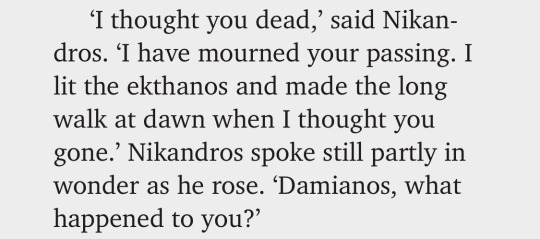
There is an Ancient Greek death ritual called the ekphora, a “ritual procession of the deceased’s body from where it had been laid out to the place of burial”. The prefix ek meant ‘out’ and phora ‘to carry’ so it literally denotes the carrying out of the body to be buried. I couldn't find 'ekthanos' as a real extant word, but with the same logic ekthanos means out + thanos- a word that can mean immortal or death depending on how you might interpret the etymology of it.
It sounds like Nikandros completed a mourning ritual and lit something (a votive lamp?) symbolically (perhaps it symbolises the leaving of the spirit, as that which removes or leads out the immortal soul from the body, hence ekthanos?). I would assume it was a funeral pyre if it weren't for the fact that Damen's body was interred (could it have been ashes that were interred? That would be safer if you're going to fake someone's death, but that's honestly me very much extrapolating from nothing. Also damn, Nikandros loves Damen. My heart honestly feels so warm about him. If that happened, and he stepped up to light the pyre when Kastor didn't, than he really is his real brother).
But for all this, there is no sense of an afterlife nor praying to deities.
More after the jump:
Edit: Unless you count Jokaste’s note to Damen, which seems to point to Greek ideas of metempsychosis/reincarnation.
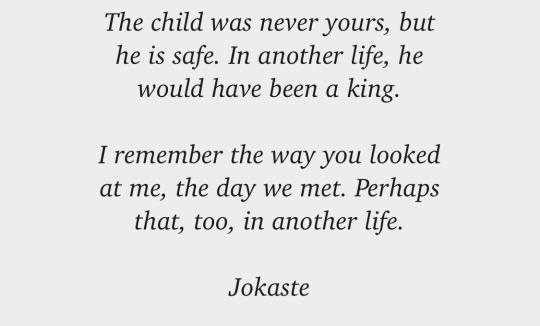
Regardless of that though there are no powerful institutions, no churches or temples, no religious figures to appease.
At first I thought there were no mentions of gods at all.
But there is.
Firstly in the very first description of Laurent in the baths:
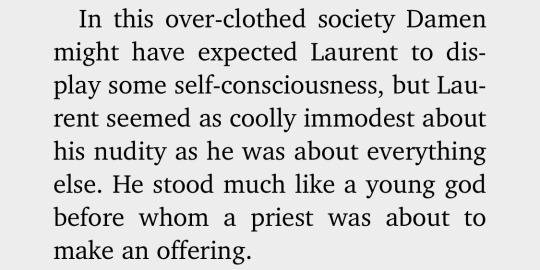
And secondly, in the Akielon epic Erasmus sings:
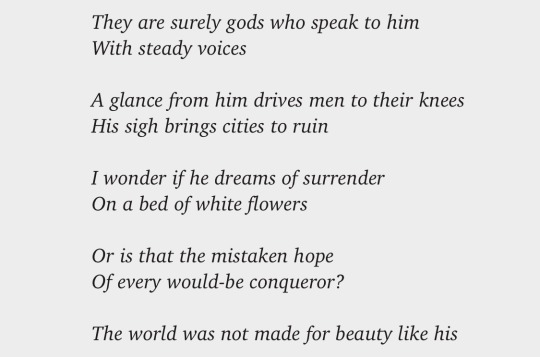
There’s also an unusual mention of Nereus who has a collection of statues in his garden. At first, because Nereus was a Greek god and because it felt faintly familiar, I took it for a classical allusion then swiftly realised on googling that it wasn’t. Or at least I don’t think so? Someone enlighten me, and I'll edit if I'm wrong.
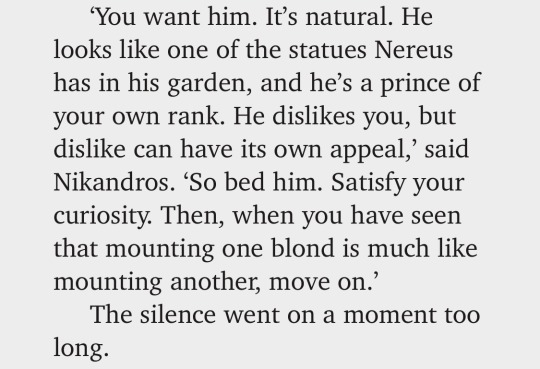
So I think we can safely assume Akielos once had gods, but the religion died out perhaps (thought not due to the rise of Christianity). And their pantheon may have been pretty much been the Greek one as the influence might linger in names like Nereus, literally a god of the sea (and Damianos from Damia, a minor goddess of fertility, and Nikandros which has a root in Nike, goddess of victory…).
Edit: having now read The Training of Erasmus, Nereus is a slave owner, and his gardens a place for young pre-pubescent slaves to have their initial training. Sigh. Reading that story really is just heartbreaking.
Keeping to the topic I suppose (even with the lingering sense of disgust that ran through me while reading it) did he collect statues that were relics of the times before and keeps them in this garden? You can see statuary fitting into this strange rarified space for the most beautiful youths. It could be some echoing of Roman pleasure gardens which generally had that sort of statuary? Or is it a mirroring of Renaissance Italy where they tried to recreate Roman gardens, taking classical statues from ruins to restore and place in them? Who knows!
Without being explicit, Pacat makes it clear that beautiful Laurent is classical-statue-beautiful. Greek god beautiful. A Ganymede, perhaps or an Adonis. And slave beautiful, too.
And, of course, Damianos has so many parallels to Achilles, from his unparalleled strength and prowess on the battlefield, to his ability to strategise as if Athena is guiding him, to how he can become blinded by rage. The warrior-hero.
Ultimately, I guess what’s interesting is Pacat’s choices. It’s really hard to avoid any religious references in writing, as these allusions are baked in so deep to language. Damen being made a slave is called a “living hell”. Laurent presents an “angelic countenance”. Damen "prays" the training arena is empty so he can escape. Orlant thinks that Akielos sounds like "paradise". Interestingly, all those quotes are from Captive Prince, and it seems as if, as Pacat went along, she steered away more and more from any kind of religious reference.
I mean, I get wanting to steer clear of religion. After polytheistic religions came the monotheistic- and then suddenly we have a whole heap of reasons why homosexuality is a sin. If we cut that off, and there is no spread of Christianity across Europe, it seems we get the bisexual culture of Vere and Akielos and Patras.
[Edit: But also sex as a sin in general does not exist. The policing of heterosexual premarital sex came into being to control reproduction, which in turn helps secure bloodlines in a patriarchal society. And so Pacat very neatly invents another social taboo as a substitute; the fear of bastardry, which means no heterosexual premarital sex EVER, and thus bisexuality becomes the norm (Damen is against this seeing it as potentially leading to situational sexual behaviour which doesn’t feel right to him).]
I also think it may have distracted from Pacat’s pared down yet evocative writing style. And added layers of unnecessary complication as the Veretian version of the Church would be another tricky, powerful and corrupt institution for him to battle and there really is no room for that in the narrative.
And just as a mini musing of a postcript, we know Laurent reads illuminated manuscripts:
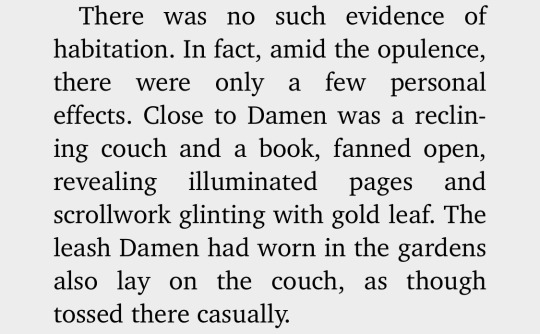
We know these surely can't be prayerbooks, so I think we can assume that they are histories and works of poetry and stories.
Stories of courtly love perhaps? Fables, legends and folklore? Old Akielon myths? I would love to know what he read.
There are two French/European stories that do come to mind when I think of Laurent.
Beauty and the Beast, of course, with Laurent-the-beautiful and Damen-the-'giant-animal', and the trope of the kind-hearted lover who thaws the heart of the one who has grown cold and cruel.
And Reynard the fox, the trickster figure, whose "sly amorality" is "sympathetic as it is needed for his survival".
And whose main antagonist is, of course, his uncle.
148 notes
·
View notes
Text

new painting wip posted to my patreon 🏃♀️
#also LOTS of meandering thoughts on the piece and stuff related to it#great if you used to like Blogs. easily ignored if you don't.#sergle art#YEAH I blurred it into smithereens. if you wanna see the lady then you have to pay The Dollar
99 notes
·
View notes